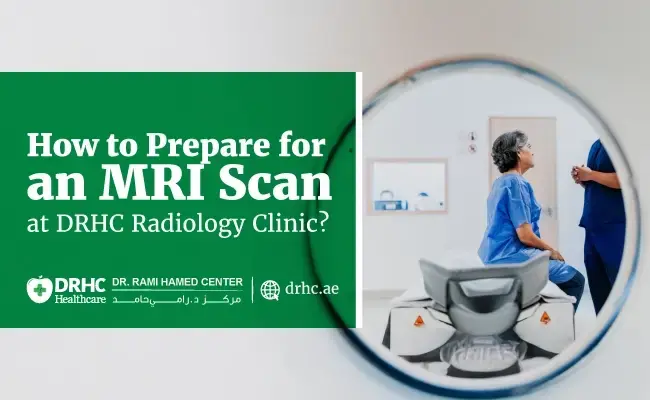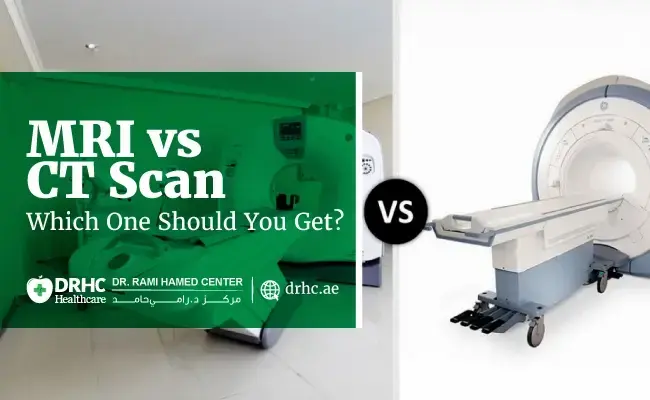.webp?width=650&height=400&name=DRHC%20BLOG%20Creatives%2002-44%20(1).webp)
Knee pain can interfere with your everyday life—making it harder to walk, exercise, or even rest comfortably. While many cases of knee pain resolve with rest and simple care, some symptoms may signal a deeper issue. If your discomfort persists, you may wonder: Is it time to get an MRI scan?
At Dr. Rami Hamed Center (DRHC) in Dubai, we understand that medical decisions can feel overwhelming, especially when you're unsure about what tests are truly necessary. This blog aims to guide you through when an MRI may be recommended for knee pain, what to expect from the scan, and how it can help with accurate diagnosis and treatment planning.
What Is an MRI and Why Is It Used for Knee Pain?
Magnetic Resonance Imaging (MRI) is a non-invasive, radiation-free scan that uses strong magnetic fields and radio waves to produce detailed images of your body’s soft tissues. For knee problems, an MRI can show:
- Ligament tears (e.g., ACL or MCL)
- Meniscus injuries (cartilage damage)
- Tendon issues
- Bone marrow swelling or bruising
- Joint inflammation or fluid build-up
- Hidden fractures or bone lesions
Unlike X-rays, which mainly show bones, MRIs offer a clearer look at the soft tissues that keep your knee stable and functional.
When Is It Time to Consider an MRI for Knee Pain?
Not every case of knee pain needs advanced imaging right away. However, your doctor at DRHC Dubai may recommend an MRI if:
- You’ve had an injury: Especially involving twisting, sudden impact, or a fall.
- Pain has lasted more than 4–6 weeks without improvement from rest, physiotherapy, or medications.
- You experience locking, catching, or instability in the knee, suggesting a possible torn meniscus or ligament.
- Swelling that comes and goes or worsens over time.
- You’ve had surgery before and are now experiencing new symptoms.
- X-rays or physical exams are inconclusive.
If you’re unsure whether your condition warrants an MRI, our orthopedic specialists at DRHC Dubai can assess your symptoms and recommend the most appropriate next steps.
Explore Our Related Blogs
- Benefits of Endoscopic Spine Surgery vs Traditional Surgery
- Why Endoscopic Spine Surgery Is a Game Changer
- How Endoscopic Discectomy is Done: Step-by-Step with Dr. Rami Hamed
- Will You Need Spine Surgery? Here’s How We Decide
- How Spine Surgery Has Changed in the Last 10 Years
- Understanding Endoscopic Spinal Decompression: Who It Helps
- What to Expect During Recovery from Endoscopic Spine Surgery
- Lower Back Pain That Won’t Go Away? You Might Need a Spine MRI
Common Patient Concerns About Knee MRI
“Is an MRI painful?”
No. MRI scans are painless. You’ll need to lie still for about 20–30 minutes while the machine captures images. If you’re anxious in enclosed spaces, let your care team know—some patients may benefit from mild sedation.
"Is it safe?"
Yes. MRIs do not use harmful radiation. They are generally safe for all ages, though you should inform your doctor if you have metal implants, pacemakers, or are pregnant.
“Can I eat and move around afterward?”
Absolutely. There’s no downtime required unless you’ve been given a sedative. You can return to your normal routine immediately after the scan.
What Happens After the MRI?
Your orthopedic doctor at DRHC Dubai will review the MRI results in detail. This allows us to:
- Confirm or rule out a diagnosis (such as a ligament tear or cartilage damage)
- Choose the right treatment—whether it’s physiotherapy, medication, or surgical intervention
- Monitor recovery after a prior surgery or injury
- Avoid unnecessary procedures when conservative treatment is still possible
The scan becomes a key piece of your personalized care plan.
Alternatives to MRI: Are There Other Options?
In some cases, X-rays or ultrasound might be used first, especially if the suspected issue involves bones or tendons. However, for complex or unclear knee problems, MRI remains the most accurate imaging tool. Your doctor will guide you based on your symptoms, history, and physical exam findings.
When to Seek Help
If your knee pain is interfering with your life, don’t wait for it to worsen. Early diagnosis can help prevent long-term damage and get you back on your feet faster.
At DRHC Dubai, our orthopedic and radiology teams work closely together to provide comprehensive care—from consultation to imaging and treatment. We offer on-site MRI services with state-of-the-art equipment and same-day reporting when urgent.
Final Thoughts
An MRI is not always the first step for knee pain—but it can be the right step when symptoms persist, injuries occur, or conservative treatment isn’t working. If you’re dealing with ongoing discomfort, instability, or swelling in your knee, we’re here to help you understand your options and provide clarity about what’s really going on inside your joint.
Appointments with our orthopedic specialists and MRI services are available at Dr. Rami Hamed Center (DRHC) in Dubai.
Your mobility matters—and getting the right diagnosis is the first step toward lasting relief.
📞 +971 4 279 8800
🌐 www.drhc.ae
📍 Dubai Healthcare City, Building 52
Topic: Radiology orthopedic Knee MRI









Leave a comment